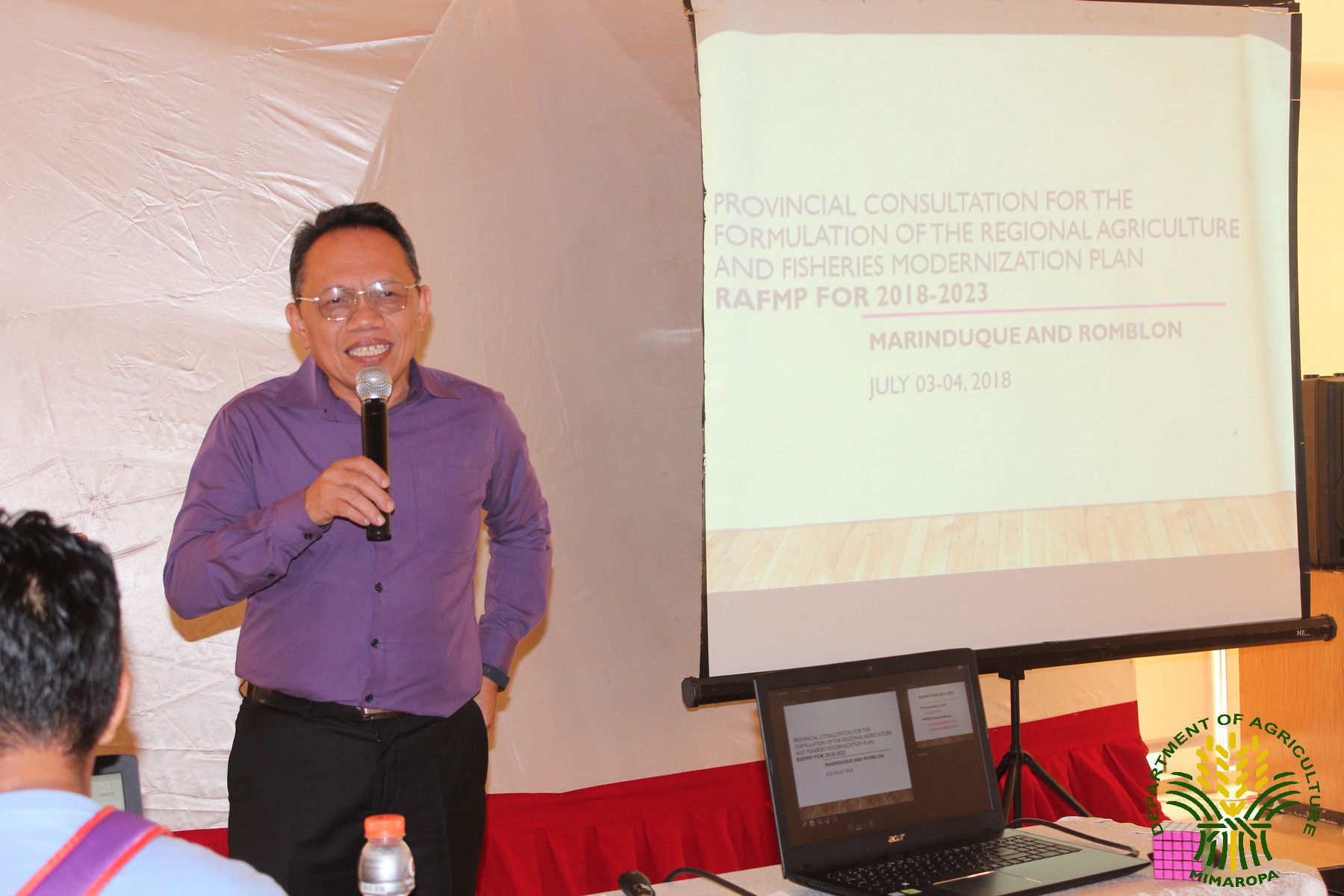Department of Agriculture-MIMAROPA (DA-MIMAROPA) conducted a series of consultation on the formulation of the Regional Agriculture & Fisheries Modernization Plan 2018-2023 for the five provinces of the region (Occidental Mindoro, Oriental Mindoro, Marinduque, Romblon and Palawan).
AFMP is the compliance for the Agriculture and Fishery Modernization Act (AFMA) of 1997, a policy in defining measures to modernize Philippine agriculture to compete with global market.
The workshop was a fourfold event that happened on May 22-23 in Palawan, May 29-30 in Oriental Mindoro, June 24-26 in Occidental Mindoro, and July 3-5 in Binondo, Manila for the Provinces of Marinduque and Romblon.
A bottom-up approach was used during the workshop where the Provincial, Municipal and City Planning and Development Officers, Municipal Agriculturists/Municipal Agricultural Officers, Provincial Veterinaries, Agriculture and Fishery Councils, representatives from different farmers’/fishers associations and cooperatives and other organized groups were consulted.
The planning focused on food security, poverty alleviation and social equity, income enhancement and profitability, global competitiveness and sustainability as discussed on the rationale and objectives of AFMP by Mr. Nex Basi, Planning Officer II of Planning, Monitoring, and Evaluation Division (PMED)-MIMAROPA.
“Ito po ay parang magiging bible namin sa pagpaplano ng mga dapat na mga interventions,” Mr. Basi explained.
In the overview of the AFMP, Dr. Celso Olido, Project Evaluation Officer II, discussed that the formulation of AFMP is also anchored on the administration’s Philippine Development Plan of 2018-2023, particularly the chapter on Expanding Economic Opportunities in Agriculture, Forestry and Fisheries (AFF) which focuses on “Pagbabago” or reducing inequality in economic opportunities.
Furthermore, this is also in compliance with the loan agreement of the Philippine Rural Development Project (PRDP), a World bank-assisted project that aims to institutionalize its best practices and science-based tools.
Formulation
Prior to each workshop, Marilyn Bienes, Chief of PMED-DA MIMAROPA, discussed the Agriculture and Fishery Assessment of 2011 to 2016. It shall be guided with the formulation of the interventions needed for the progress and modernization of the industry. Regional banner program coordinators/report officers ( Rice, Corn, HVCDP, Livestock and Organic Agriculture) had presented their priority projects and programs of the Region for the next six years. Ditto, for the Fisheries and the newly-launched HALAL program.
Representatives from line agencies such as National and Economic and Development Authority, Bureau of Fisheries and Aquatic Resources, Department of Interior and Local Government, Philippine Crop Insurance Corporation, Department of Science and Technology, Technical Education and Skills Development Authority, Department of Environment and Natural Resources, Department of Social Welfare and Development, Department of Trade and Industry, Philippine Coconut Authority and different State Universities and College, among others were also invited in the workshops. They were tasked to guide the participants in identifying interventions and projects that can be funded by their agency.
Sheryl Sarabia, OIC, Policy Formulation and Planning Division of NEDA-MIMAROPA, advised the participants in Occidental Mindoro that the interventions should be doable, has project profile, concurrent with the Regional Development Plan, and are endorsed by their chief executives.
Regional Executive Director Antonio G. Gerundio had the opportunity to visit the workshop in Binondo, Manila. In his message, he encouraged the participants to strengthen the marketing aspect of agriculture and also to give emphasis on how to compete with precision agriculture in the modern world.
“I encourage you to improve your thinking process para matulungan natin maiangat ang buhay ng mga farmers. Kasi paano natin sila mai-encourage to produce more for the country kung hindi natin sila mai-inspire na maiangat ang buhay nila,” he said.
To put the needed projects and programs, the participants were provided with Data Capture Forms or templates for the needed interventions for production support, agribusiness and marketing, extension support, education, and training services, research and development; rural infrastructure, agriculture and fishery policy services, regulatory support and services, and credit and insurance. They were asked to specify the commodities, physical targets, estimated costs and its fund sources, as well as the target beneficiaries.
Chosen municipalities had the chance to present their outputs for assessment of PMED. It also opened the floor for clarifications on some issues rose which the PMED and other line agencies were able to address and explain.
After the submission of Data Capture Forms of each province, the PMED-MIMAROPA will consolidate the data and write the final draft of the Region’s AFMP that will be submitted to the DA Central Office.


